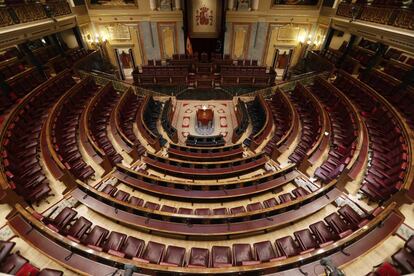Caretaker government says talks with Podemos have “completely broken down”
Ahead of today’s second investiture vote, it is looking very unlikely that acting Prime Minister Pedro Sánchez will be able to count on the support of the left-wing party

Spain’s caretaker administration considers that negotiations with Unidas Podemos to form a government have “completely broken down,” sources from the executive said yesterday, blaming the impasse on the “unacceptable” demands of the left-wing anti-austerity party led by Pablo Iglesias.
The Socialist Party (PSOE) government of acting Prime Minister Pedro Sánchez has said that if it were to bow to the requirements of the party in exchange for its support at today’s investiture vote, it would be “creating two governments” within one, leaving the majority of social and economic policies in the hands of Iglesias.
The main sticking point was the Labor Ministry, which Unidas Podemos wanted control of
Unidas Podemos, meanwhile, did not officially confirm that the negotiations had broken down and said instead that it “continued to opt for a coalition government.”
At a Tuesday vote that followed a tense two-day investiture debate in Congress, Sánchez received 124 yes votes: 123 from his own lawmakers and one from the single representative for a small party from the northern region of Cantabria. Unidas Podemos abstained in the vote, while the conservative Popular Party, center-right Citizens (Ciudadanos) and far-right Vox voted no.
That left Sánchez far short of the 176 votes he needed for an absolute majority. At around midday today, a second, shorter, debate will start, after which the acting PM’s candidacy will once again be put to the lower house of parliament. A simple majority of more yes than no votes will be needed for him to prosper. If he fails again, there will be a two-month period to find a new candidate, after which Spain will be facing a fresh general election, the fourth in under four years.
The failure of the talks has also sparked internal tensions within Unidas Podemos
Sources from the acting government have told EL PAÍS that the last offer from Sánchez to Iglesias included a deputy prime minister role, covering Social Affairs, as well as three ministries: Housing and Social Economy; Health and Social Affairs; and Consumer Affairs and Equality.
The main sticking point, according to sources from the negotiation, was the Labor Ministry, which Iglesias wanted control of. The PSOE, for its part, rejected this, on the basis that the left-wing party is unpopular in a number of economic sectors – in particular among businesses – and as such could not be in control of policies as important as labor regulations.
“They went as far as saying to us that we couldn’t have the Labor portfolio because ‘we are uncomfortable for the CEOE’,” Podemos sources stated, in reference to Spain’s largest business association.
The failure of the negotiations, which have been ongoing since the inconclusive results of the April 28 general election, have also sparked internal tensions within Unidas Podemos. The United Left party (IU), an important part of the coalition, will be meeting today to decide how it will cast its vote in Congress, with a possibility that it might break ranks with Podemos.
In some sectors of IU there is unease about the personal way that Iglesias has handled the talks, not allowing for outside influence. The IU currently counts on six of the 42 deputies that Unidas Podemos has in total. Its vote will not be a determining factor but a break in ranks would be politically significant.
The breakdown of the talks took place on Wednesday evening. Shortly after, the PSOE made public a document in which, they claimed, were all of the demands of Unidas Podemos. The party was, the Socialists said, demanding a deputy prime ministerial role and five ministries. Podemos responded, however, by stating that the document was the starting point for the talks “sent last Saturday to begin the debate.” The PSOE claimed in response that the party had not moved from those demands.
English version by Simon Hunter.
Tu suscripción se está usando en otro dispositivo
¿Quieres añadir otro usuario a tu suscripción?
Si continúas leyendo en este dispositivo, no se podrá leer en el otro.
FlechaTu suscripción se está usando en otro dispositivo y solo puedes acceder a EL PAÍS desde un dispositivo a la vez.
Si quieres compartir tu cuenta, cambia tu suscripción a la modalidad Premium, así podrás añadir otro usuario. Cada uno accederá con su propia cuenta de email, lo que os permitirá personalizar vuestra experiencia en EL PAÍS.
¿Tienes una suscripción de empresa? Accede aquí para contratar más cuentas.
En el caso de no saber quién está usando tu cuenta, te recomendamos cambiar tu contraseña aquí.
Si decides continuar compartiendo tu cuenta, este mensaje se mostrará en tu dispositivo y en el de la otra persona que está usando tu cuenta de forma indefinida, afectando a tu experiencia de lectura. Puedes consultar aquí los términos y condiciones de la suscripción digital.








































